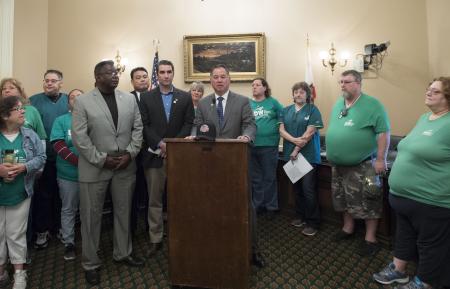 Caregivers, Veterans, Labor and Business Support AB 1356
Caregivers, Veterans, Labor and Business Support AB 1356
(Sacramento, CA)-Assemblymember Phil Ting (D-San Francisco) announced historic legislation that, if passed, will dramatically improve access to cannabis across California. AB 1356 will require local jurisdictions, where more than 50% of voters supported Proposition 64, to issue one cannabis retail license for every four onsite liquor consumption licenses.
“Californians voted for Prop. 64 to replace the illicit market with a legal system that would grant Californians safe access to cannabis products, while also creating good jobs and significant tax revenue,” said Assemblymember Ting, author of AB 1356. “However, these goals can only be fully realized if enough licenses are granted to meet existing demand. This bill will ensure the legal market can succeed.”
“When California voters supported Prop. 64 they made clear the importance of access to cannabis products. For many, including seniors, veterans, young people with childhood maladies and individuals with disabilities, cannabis serves an important medical purpose. Many cities and counties are currently not providing this access to their medically challenged constituents, even when a majority of their constituents voted for Prop. 64. Banning and limiting access to cannabis in these jurisdictions only fuels the illicit market in our state,” said Assemblymember Reginald Jones-Sawyer (D-South Los Angeles). “I am proud to co-author AB 1356 (Ting), a measure that will ensure local governments respect the will of the voters by increasing access to safe cannabis products from the legal cannabis market.”
Nearly two and a half years after the passage of Prop. 64, and a year and half after the introduction of the California legal retail cannabis market, approximately 76% of California cities and counties have banned cannabis retail businesses.
“As a union of caregivers, UDW members are driven by compassion and the desire to provide comfort,” said Doug Moore, executive director of UDW/AFSCME Local 3930, a labor union representing more than 110,000 of California’s In-Home Supportive Services (IHSS) providers. “Many of our members and their clients choose to use cannabis for relief, and we believe that they should not be burdened by lack of access. We support AB 1356 because it will ensure that those who choose to use cannabis will be treated equally regardless of where they live.”
“The legal cannabis market in California has been stalled dramatically,” said Julian Canete, president and CEO of California Hispanic Chambers of Commerce. “Labor and business have come together in support of AB 1356 because it will expand and expedite permitting for legal cannabis retailers, increasing access and business opportunities to minority communities across the state, which have traditionally been targets of the ‘War on Drugs.’”
“Despite voters approving Prop. 64, there are cannabis deserts across the state where veterans and patients have to drive long distances to a licensed shop,” said Aaron Augustis, founder of Veterans Cannabis Group, an advocacy group comprised of veterans who use medical cannabis. “We served our country and want to work with our local cities, counties, and state governments to ensure our veterans have safe access across the state to medicinal cannabis. AB 1356 is crucial for veterans’ access.”
For local jurisdictions that do not want to meet the 25% ratio, AB 1356 allows them to put a local ban on the ballot at the next scheduled election.
The bill is scheduled to be first heard on April 23, 2019 in the Assembly Business and Professions Committee.
# # #